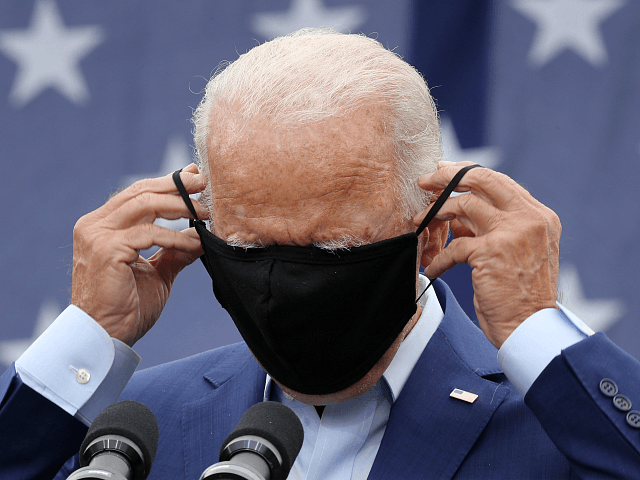President Joe Biden admitted this week that he had failed to anticipate the omicron coronavirus surge, as he struggled to explain why it could take weeks or longer for 500 million at-home tests to be available for Americans.
“[Y]ou could argue that we should have known a year ago, six months ago, two months ago, a month ago,” he said. The reason he failed was that his administration failed to learn from the successful example of President Donald Trump’s Operation Warp Speed.
Trump was criticized at the start of the pandemic for failing to produce enough tests. Biden attacked Trump over testing, and promised to focus on it in his administration — a promise he failed to keep.
The reality, as even Dr. Anthony Fauci said, was that the testing problem was not Trump’s fault: the U.S. government wanted to control test production, unlike South Korea, which used private-sector companies. When government agencies mismanaged test production, there was no alternative.
So when it came to a vaccine, Trump decided he had to break the old model. He cut through bureaucratic red tape at the Food and Drug Administration, and recruited the private sector to develop a variety of alternatives.
Crucially, and controversially, the government purchased hundreds of millions of doses of vaccines that had yet to be proven, so that if and when they were shown to work, they could be distributed rapidly. Despite a few early hiccups in distribution, the plan was a huge success.
When then-President-elect Biden received the vaccine a year ago, he gave the Trump administration “some credit” for developing it. Later, he barely acknowledged Trump’s role.
Press secretary Jen Psaki refused to give Trump any credit, saying the vaccine was the result of an “incredible effort by science and by medical experts.”
Only this week, after Trump promoted vaccine booster shots, did Biden thank “the prior administration and our scientific community” (emphasis added).
The long reluctance to give Trump credit reflected the idea that anything Trump did was somehow contaminated. Biden and his administration would rather reinvent the proverbial wheel than learn from Trump’s successful policies.
For example, the Biden administration ignored Trump’s successful strategy of isolating Iran and tried to negotiate with the regime for a year before Secretary of State Anthony Blinken finally realized that Iran “does not seem to be serious” about non-proliferation.
Likewise on testing, and on therapeutics such as Paxlovid, the new COVID-19 bill developed by Pfizer. Rather than learn from Operation Warp Speed, and use money from the massive coronavirus relief bills to purchase tests and doses in advance, the Biden Administration focused exclusively on the vaccines, which Trump had already developed.
Over time, that strategy became coercive, as Biden issued mandates on both the public and private sectors that are still being challenged in court.
Americans will probably remain divided over Trump for generations, but one thing that is widely recognized — except in elite Washington circles — is that the world saw, for the first time, what can happen when a political outsider with a track record of success in private life applies those methods to government.
The policy establishment felt displaced — which is why Democrats, the party of government, reverted to the old way of doing things at the earliest possible opportunity.
Some aspects of Trump’s leadership did not work well: the proprietor of a family-owned business can say what he likes, but the leader of a nation has to choose words more carefully.
Still, what Operation Warp Speed showed was that government, if led properly, could innovate for the future, even in the face of uncertainty. “I don’t think about the former president,” Biden said earlier this month. Perhaps he and his advisers should think about Trump’s successes a little more, and learn from them.
Joel B. Pollak is Senior Editor-at-Large at Breitbart News and the host of Breitbart News Sunday on Sirius XM Patriot on Sunday evenings from 7 p.m. to 10 p.m. ET (4 p.m. to 7 p.m. PT). He is the author of the recent e-book, Neither Free nor Fair: The 2020 U.S. Presidential Election. His recent book, RED NOVEMBER, tells the story of the 2020 Democratic presidential primary from a conservative perspective. He is a winner of the 2018 Robert Novak Journalism Alumni Fellowship. Follow him on Twitter at @joelpollak.

COMMENTS
Please let us know if you're having issues with commenting.